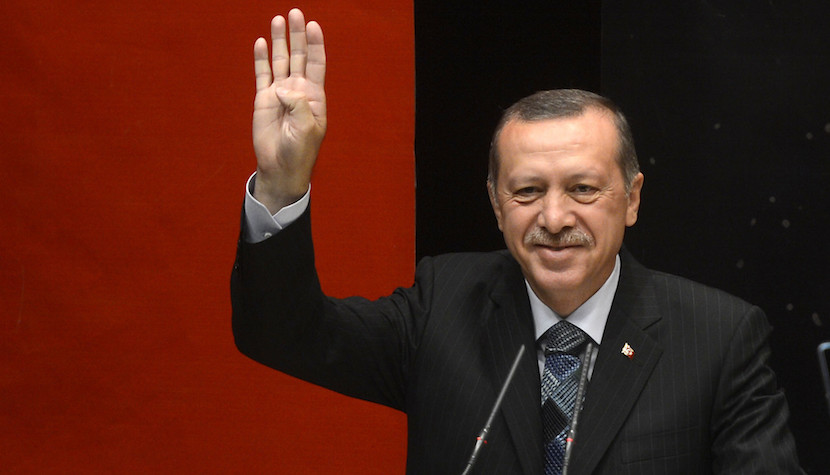The crushing loss of the seemingly-assured majority of his AK Party, leaves President Recep Erdogan facing massive anxiety. Erdogan had calculated his AK Party would support his plans to reshape the war-threatened nation into an enduring dictatorship; yet now the coming challenge is for Erdogan and the AK to construct a working coalition within 45 days – or return to fresh elections in which the president is in “decline”, according to an informed observer, who notes the corruption allegations swirling around Erdogan. The leader is also confronting a 1-million Syrian refugee crisis and the global intellectual climate that has again given rise to allegations of the “Armenian Genocide”. Peter Wilhelm
By Selcan Hacaoglu & Onur Ant
 (Bloomberg) — President Recep Tayyip Erdogan asked Turkey for a mandate to reshape the country’s political system and give him more power. On Sunday, Turkish voters replied with a no.
(Bloomberg) — President Recep Tayyip Erdogan asked Turkey for a mandate to reshape the country’s political system and give him more power. On Sunday, Turkish voters replied with a no.
Preliminary results showed the ruling AK Party — which Erdogan led for more than a decade before becoming president last year — short of the majority needed for a single-party government, Erdogan wants to see push for a presidential system. This would considerably expand his powers. So the results are a blow to Erdogan, who manipulated the vote into a referendum on his rule. It suggests that after more than a decade as the nation’s most influential politician, he may have over-reached the willingness of the electorate to keep him.
Opposition newspaper Sozcu labelled the result “Collapse” on its front page on Monday. Stocks tumbled and the lira plunged to a record low.
“This is a major defeat both for Erdogan and the AK Party,” Ozer Sencar, head of MetroPOLL Strategic and Social Research, said Sunday by phone from Ankara. “It’s a clear sign that his power is in decline.”
Erdogan argued on the campaign trail that a strong presidency was necessary for Turkey to become one of the world’s top 10 economies by 2023, the centennial of the nation’s birth. Critics said his increasingly autocratic tendencies have damaged the Middle East’s largest economy and key NATO ally.
Since becoming Turkey’s first ever-popularly elected president in August, Erdogan has refashioned the traditionally ceremonial role as a new centre of control that has sometimes placed him at odds with the government run by his hand-picked successor, Prime Minister Ahmet Davutoglu. There are several economic issues at stake, as well as how Turkey will seek to position itself in the increasingly torrid Middle East conflict and Western intervention.
Erdogan assailed the central bank repeatedly for not cutting interest rates low enough to spur economic growth. His rejection at the polls means the bank “may have more room to act independently”, Yarkin Cebeci, an economist at JPMorgan Chase & Co. in Istanbul, said in e-mailed comments.
“Not being able to consolidate power could become a real problem for the president,” Anthony Skinner, head of analysis for the Middle East & North Africa at UK-based forecasting company Verisk Maplecroft, said in an e-mail on June 4. Erdogan’s “confrontational style of rule – marked by the harassment, fining or arrest of proven or suspected political opponents,” explains why his enemies have chafed for the president’s downfall.
They may be kept waiting. Erdogan does not face a presidential election until 2019. In the meantime, the potential for confusion as attempts are made to form a government may present him with another opportunity to fulfil his plans.
“There is clearly a serious failure and decline in support for Erdogan and AK Party following an intense campaign by the president and the prime minister,” Haluk Ozdemir, head of international relations at Kirikkale University, said by phone. Still: “Erdogan will most certainly use this political uncertainty as an argument to push for the presidential system, which he says would eliminate risk of coalition governments and political instability.”
If no coalition government can be formed within 45 days, then fresh elections will be called. Even then, however, Erdogan may struggle to find his winning touch, according to Sencar. The decline in Erdogan’s support happened “much faster” than some had expected after a string of corruption allegations tarred the government, he said.
Turkey’s slowing economy may have also played a role. After a decade of growth averaging 5 percent, the economy has lost momentum, with unemployment at its highest level in five years. The lira dropped the most since October 2008 on a closing basis to 2.8096 per dollar before trading at 2.7650 at midday Wednesday. The Borsa Istanbul 100 Index traded 6 percent lower after sinking 8.2 percent at the open of trading.
“The economy isn’t in a crisis but it’s not growing as fast as it used to,” Sencar said. “Inflation is climbing, unemployment is high. All these had a role to play in Erdogan’s decline.”


